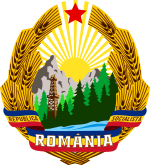
Decebalus, sometimes referred to as Diurpaneus, was the last Dacian king. He is famous for fighting three wars, with varying success, against the Roman Empire under two emperors. After raiding south across the Danube, he defeated a Roman invasion in the reign of Domitian, securing a period of independence during which Decebalus consolidated his rule.
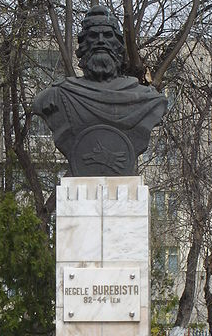
Burebista was the king of the Getae and Dacian tribes from 82/61 BC to 45/44 BC. He was the first king who successfully unified the tribes of the Dacian kingdom, which comprised the area located between the Danube, Tisza, and Dniester rivers, and modern day Romania and Moldova. In the 7th and 6th centuries BC it became home to the Thracian peoples, including the Getae and the Dacians. From the 4th century to the middle of the 2nd century BC the Dacian peoples were influenced by La Tène Celts who brought new technologies with them into Dacia. Sometime in the 2nd century BC the Dacians expelled the Celts from their lands. Dacians often warred with neighbouring tribes, but the relative isolation of the Dacian peoples in the Carpathian Mountains allowed them to survive and even to thrive. By the 1st century BC the Dacians had become the dominant power.

The Romanian Communist Party was a communist party in Romania. The successor to the pro-Bolshevik wing of the Socialist Party of Romania, it gave an ideological endorsement to a communist revolution that would replace the social system of the Kingdom of Romania. After being outlawed in 1924, the PCR remained a minor and illegal grouping for much of the interwar period and submitted to direct Comintern control. During the 1920s and the 1930s, most of its activists were imprisoned or took refuge in the Soviet Union, which led to the creation of competing factions that sometimes came into open conflict. That did not prevent the party from participating in the political life of the country through various front organizations, most notably the Peasant Workers' Bloc. During the mid-1930s, due to the purges against the Iron Guard, the party was on the road to achieving power, but the dictatorship of king Carol II crushed this. In 1934–1936, PCR reformed itself in the mainland of Romania properly, with foreign observers predicting a possible communist takeover in Romania. The party emerged as a powerful actor on the Romanian political scene in August 1944, when it became involved in the royal coup that toppled the pro-Nazi government of Ion Antonescu. With support from Soviet occupational forces, the PCR pressured King Michael I into abdicating, and it established the Romanian People's Republic in December 1947.

Dacianism is a Romanian term describing the tendency to ascribe, largely relying on questionable data and subjective interpretation, an idealized past to the country as a whole. While particularly prevalent during the regime of Nicolae Ceaușescu, its origin in Romanian scholarship dates back more than a century.

Conducător was the title used officially by Romanian dictator Ion Antonescu during World War II, also occasionally used in official discourse to refer to Carol II and Nicolae Ceaușescu.
Iosif Constantin Drăgan was a Romanian and Italian businessman, writer, historian and founder of the ButanGas company. In 2005, he was the second-wealthiest Romanian, according to the Romanian financial magazine Capital, having a wealth estimated at $850 million. According to the same financial magazine, in 2006, he became the wealthiest Romanian, at $1.3-1.6 billion.

Ilie Ceaușescu was a Romanian army general and communist politician who was Deputy Defence Minister of Communist Romania during the rule of his older brother, Nicolae Ceaușescu.

The July Theses is a name commonly given to a speech delivered by Romanian leader Nicolae Ceaușescu on July 6, 1971, before the executive committee of the Romanian Communist Party (PCR). Its full name was Propuneri de măsuri pentru îmbunătățirea activității politico-ideologice, de educare marxist-leninistă a membrilor de partid, a tuturor oamenilor muncii. This quasi-Maoist speech marked the beginning of a "mini cultural revolution" in the Socialist Republic of Romania, launching a Neo-Stalinist offensive against cultural autonomy, a return to the strict guidelines of socialist realism and attacks on non-compliant intellectuals. Strict ideological conformity in the humanities and social sciences was demanded. Competence and aesthetics were to be replaced by ideology; professionals were to be replaced by agitators; and culture was once again to become an instrument for communist propaganda.
National communism is a term describing various forms in which Marxism–Leninism and socialism has been adopted and/or implemented by leaders in different countries using aspects of nationalism or national identity to form a policy independent from communist internationalism. National communism has been used to describe movements and governments that have sought to form a distinctly unique variant of communism based upon distinct national characteristics and circumstances, rather than following policies set by other socialist states, such as the Soviet Union.
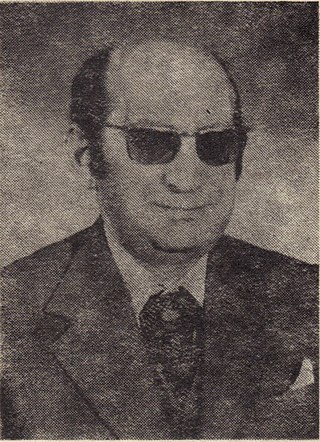
Zigu Ornea was a Romanian cultural historian, literary critic, biographer and book publisher. The author of several monographs focusing on the evolution of Romanian culture in general and Romanian literature in particular, he chronicled the debates and meeting points between conservatism, nationalism, and socialism. His main early works are primarily dedicated to the 19th and early 20th century cultural and political currents heralded by Junimea, by the left-wing ideologues of Poporanism and by the Sămănătorul circle, followed independently or in relation to one another. Written as expansions of this study were Ornea's biographical essays on some of the period's leading theorists: Titu Maiorescu, Constantin Dobrogeanu-Gherea and Constantin Stere.
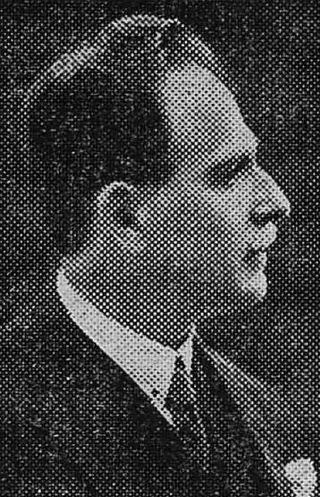
Alexandru Toma was a Romanian poet, journalist and translator, known for his communist views and his role in introducing Socialist Realism to Romanian literature. Having debuted as a Symbolist, Toma was influenced by 19th-century writer Mihai Eminescu, an admiration which came to characterize his entire work. The official poet during the early years of the Communist regime and appointed a full member of the Romanian Academy, he is considered by many commentators to have actually been a second-shelf writer, with a problematic legacy.

Romanian nationalism is the nationalism which asserts that Romanians are a nation and promotes the cultural unity of Romanians. Its extremist variation is Romanian ultranationalism.
Censorship in Communist Romania occurred during the Socialist Republic in two stages: under the first Communist president Gheorghe Gheorghiu-Dej (1947-1965) and the second and last Communist president Nicolae Ceaușescu (1965-1989).

George Ivașcu was a Romanian journalist, literary critic, and communist militant. From beginnings as a University of Iași philologist and librarian, he was drawn into left-wing antifascist politics, while earning accolades as a newspaper editor and foreign-affairs journalist. As editor of Manifest magazine, he openly confronted the Iron Guard and fascism in general. In the mid-1930s, he became a member of the Romanian Communist Party (PCdR), though he maintained private doubts about its embrace of Stalinism. Despite enjoying protection from the more senior scholar George Călinescu, Ivașcu was persecuted, and went into hiding, during the first two years of World War II. He reemerged as a pseudonymous correspondent, then editorial secretary, of the magazine Vremea, slowly turning it away from fascism. In parallel, he also contributed to the clandestine left-wing press and supported the resistance groups, preparing for an Allied victory.
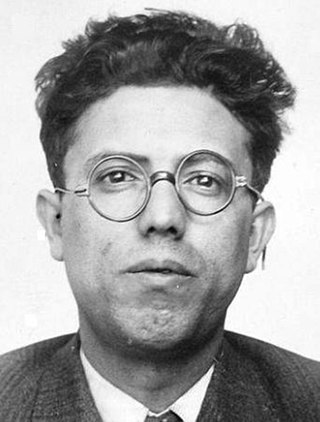
Mihail Roller was a Romanian communist activist, historian and propagandist, who held a rigid ideological control over Romanian historiography and culture in the early years of the communist regime. During his training in engineering, he rallied with the communist cells in Romania and abroad, joining the Romanian Communist Party while it was still an underground group. He collaborated with the Agitprop leaders Leonte Răutu and Iosif Chișinevschi, spent time in prison for his communist activity, and ultimately exiled himself to the Soviet Union, where he trained in Marxist historiography.
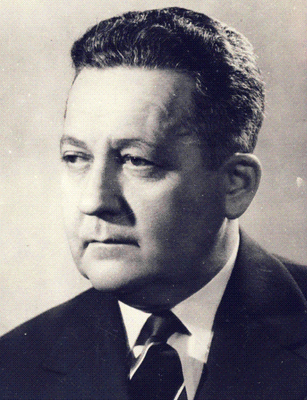
Leonte Răutu was a Bessarabian-born Romanian communist activist and propagandist, who served as deputy prime minister in 1969–1972. He was chief ideologist of the Romanian Communist Party during the rule of Gheorghe Gheorghiu-Dej, and one of his country's few high-ranking communists to have studied Marxism from the source. Răutu was of Jewish origin, though he embraced atheism and anti-Zionism. His adventurous youth, with two prison terms served for illegal political activity, culminated in his self-exile to the Soviet Union, where he spent the larger part of World War II. Specializing in agitprop and becoming friends with communist militant Ana Pauker, he joined the Romanian section of Radio Moscow.
Costin Ion Murgescu was a Romanian economist, jurist, journalist and diplomat. A supporter of fascism during his youth, he switched to communism by the end of World War II, and became an editor of the Communist Party daily organ, România Liberă. He taught at the University of Bucharest and worked for the Economic Research Institute. Having campaigned for multilateralism in world affairs as early as 1944, he helped to distance Romania from the Soviet Union after 1964, and later represented his country at the United Nations. He wrote extensively, publishing works on the effects of land reform and industrialization, on the history of economic thought, and on Romania's relations with the Comecon and the First World.

Mihai Dumitru Ralea was a Romanian social scientist, cultural journalist, and political figure. He debuted as an affiliate of Poporanism, the left-wing agrarian movement, which he infused with influences from corporatism and Marxism. A distinguished product of French academia, Ralea rejected traditionalism and welcomed cultural modernization, outlining the program for a secular and democratic "peasant state". Mentored by critic Garabet Ibrăileanu, he objected to the Poporanists' cultural conservatism, prioritizing instead Westernization and Francophilia; however, Ralea also mocked the extremes of modernist literature, from a position which advocated "national specificity". This ideology blended into his scholarly work, with noted contributions to political sociology, the sociology of culture, and social and national psychology. He viewed Romanians as naturally skeptical and easy-going, and was himself perceived as flippant; though he was nominally active in experimental psychology, he questioned its scientific assumptions, and preferred an interdisciplinary system guided by intuition and analogies.
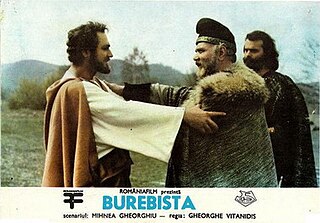
Burebista (1980) is a Romanian historical epic film about the life of the ancient Dacian king Burebista, depicting his battle to unify his nation and to resist Roman incursions.
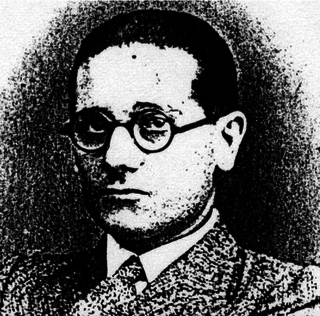
Nicolae Crevedia was a Romanian journalist, poet and novelist, father of the writer-politician Eugen Barbu. Of Muntenian peasant roots, which shaped his commitment to agrarian and then far-right politics, as well as his dialectal poetry and humorous prose, he preferred bohemian life to an academic career. As a writer at Gândirea, Crevedia became a follower of Nichifor Crainic, and worked with him on various other press venues, from Calendarul to Sfarmă-Piatră. Turning to fascism, he sympathized with the Iron Guard, and, in the late 1930s, contributed to the press campaigns vilifying ideological enemies, while also putting out novels, reportage pieces, and anthologies. His affair with the Iron Guard muse Marta Rădulescu was at the center of a literary scandal, and was fictionalized by Crevedia in one of his novels.
